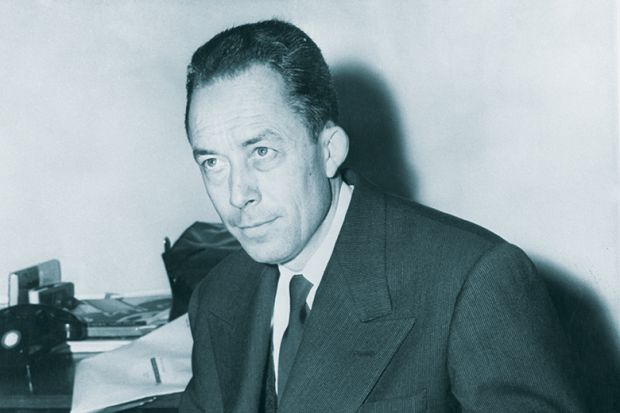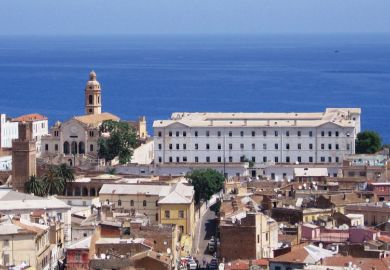This lovingly written and deeply moral book is a hagiography. Its “aspiring saint without God” is Albert Camus, French novelist and thinker, Nobel laureate, called “the conscience of Europe” by his contemporaries. The book sets Camus’ “moral clarity”, “prophetic wisdom” and affirmation of our common humanity against the dissent, division and “daily denial of the human ‘we’” of our current world. Hagiographies teach through inspiration, and so Robert Emmet Meagher, a distinguished scholar of religion, Classics and philosophy, and an activist on behalf of those traumatised by war, invites us to his “final class on Camus”.
There are strengths to hagiographies. Uninterested in tittle-tattle, the book focuses on Camus’ core ideas and takes us through all his work, offering insightful and moving readings of their meaning. Meagher’s Camus is suffused by classical Greek culture and Christian thought: a key figure, Meagher argues, was St Augustine (Camus called him “the other Algerian”). Assuming this intellectual context, and perhaps giving it a touch too much significance, Meagher is especially interesting on the evolution of Camus’ thought and its sympathies for, though not endorsement of, Christianity. A “religious man without religion”, Camus was “neither Marxist nor Christian”, nor an existentialist, but a witness to human suffering. Meagher shows how considering the importance of our stories and the “language of common humanity”, which characterises Camus’ life and work, is the response to the human crisis.
But hagiography is not an academic genre. Not because there are not wonderful, brilliant and even holy people (of course there are), nor because academics petty-mindedly seek to tear down icons. Hagiography is not an academic genre because scholarship is about dialogue with each other, with the past and with the future: what dialogue is possible with someone made a saint or with a colossus who bestrides the narrow world? None: as Shakespeare’s Cassius says of Caesar, we walk under their huge legs and peep about. The very subject of this book aggravates this problem: when asked, Camus said that his philosophy “consisted of doubts and uncertainties” and he sought, precisely, human dialogue. Yet the more fulsomely he and his work are praised by Meagher, the less dialogue seems conceivable.
But dialogue is possible, even if it’s uncomfortable. Here’s one emotive example of what I mean. Camus stood against colonial abuses in Algeria, but in discussing the meaning of the murder in The Stranger, Meagher writes that to “focus on the dead Arab is to miss the point”. Yet Kamel Daoud’s prize-winning 2013 novel The Meursault Investigation is in dialogue with The Stranger and focuses on the victim, giving him a name, Musa, providing him and his family with their (and Algeria’s) story. This is both criticism of and dialogue with Camus.
The point of mentioning this is not to score a cheap point but to suggest that ascribing something like saintliness to people removes them from our world and limits our engagement with them. Perhaps we do more justice to our heroes, and learn more from them too, when we see them only as people.
Robert Eaglestone is professor of contemporary literature and thought at Royal Holloway, University of London. His most recent book is Truth and Wonder: A Literary Introduction to Plato and Aristotle (2021).
Albert Camus and the Human Crisis
By Robert Emmet Meagher
Pegasus Books, 352pp, £20.00
ISBN 9781643138213
Published 2 November 2021
Register to continue
Why register?
- Registration is free and only takes a moment
- Once registered, you can read 3 articles a month
- Sign up for our newsletter
Subscribe
Or subscribe for unlimited access to:
- Unlimited access to news, views, insights & reviews
- Digital editions
- Digital access to THE’s university and college rankings analysis
Already registered or a current subscriber?








